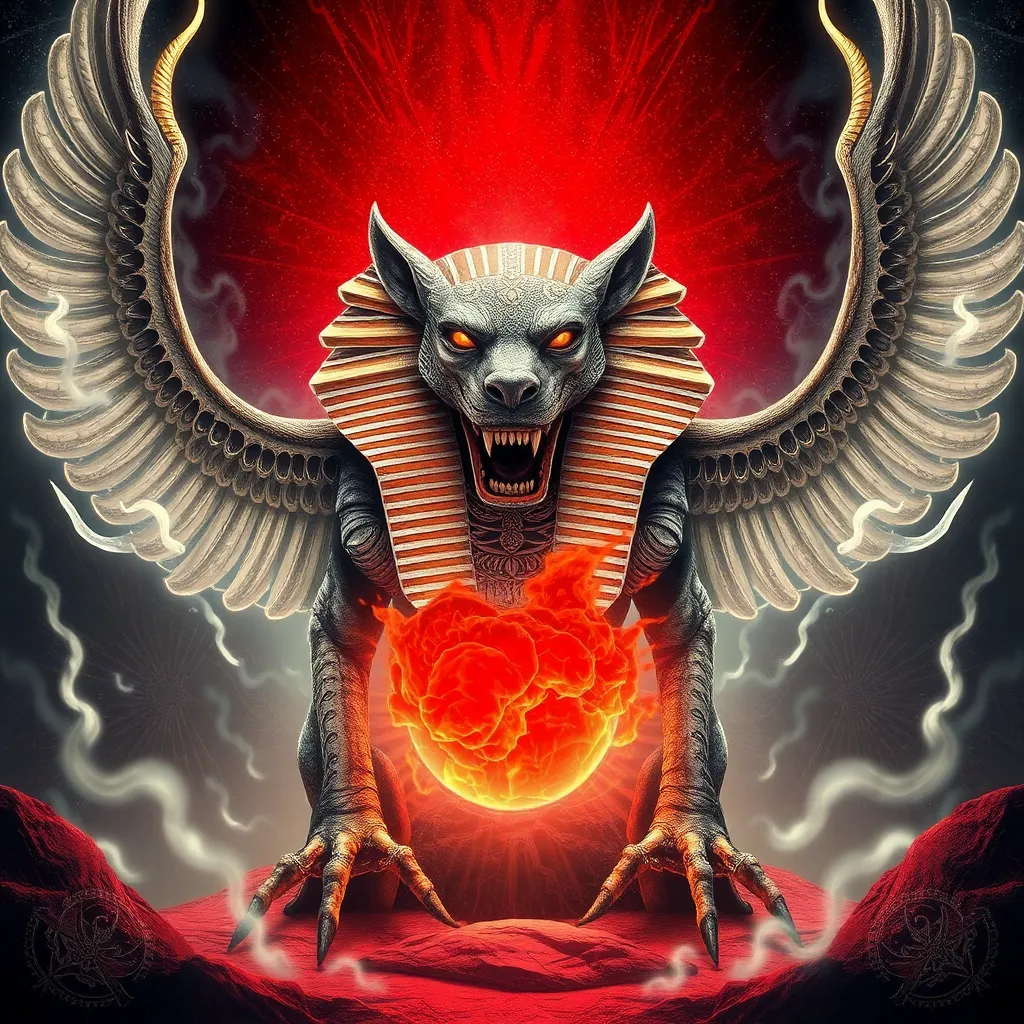Ammit: The Devourer and the Heart’s Weight
I. Introduction
Ammit is a prominent figure in Ancient Egyptian mythology, often depicted as a fearsome creature associated with the afterlife and judgment. Known as the ‘Devourer of the Dead,’ Ammit plays a crucial role in the spiritual fate of souls who have passed beyond the mortal realm. In Ancient Egyptian beliefs, the heart was considered the most vital organ, representing the essence of a person’s character and deeds throughout their life.
This article aims to explore the rich symbolism and significance of Ammit, her role in the afterlife, and the deep moral implications tied to the heart’s weight during the judgment process.
II. The Mythological Context of Ammit
Ammit is uniquely characterized by her physical attributes, embodying a fearsome mix of three powerful animals:
- Lion: Symbolizing strength and ferocity.
- Hippopotamus: Representing chaos and danger in water.
- Crocodile: A creature of the Nile, embodying predatory instincts.
Her terrifying form serves as a reminder of the consequences of a life poorly lived. Ammit’s primary role in the afterlife is to partake in the judgment of souls, determining their fate based on the Weighing of the Heart ceremony, which is presided over by the god Osiris.
III. The Weighing of the Heart Ceremony
The Weighing of the Heart ceremony takes place in the Hall of Ma’at, a sacred space where the deceased are judged. During this process, the heart, believed to be the seat of the soul, is weighed against the feather of Ma’at, the goddess of truth and justice.
Key elements of this ceremony include:
- The Heart: Considered the record of one’s actions and moral worth.
- The Feather of Ma’at: Symbolizing truth and justice.
- The Scales: Used to weigh the heart against the feather, determining the soul’s fate.
If the heart is lighter than the feather, the soul is deemed worthy and allowed to enter the afterlife. If it is heavier, it signifies a life of wrongdoing, leading to the dreaded fate of being devoured by Ammit.
IV. Ammit’s Role as the Devourer
Ammit’s function in the judgment process is clear: she is the ultimate consequence for those who fail to live ethically. Once a soul’s heart is found to be heavier than the feather, Ammit will devour it, leading to the complete annihilation of the individual’s existence.
The consequences for unworthy souls are dire:
- Destruction of the Soul: The soul is permanently extinguished.
- Fear and Terror: Her presence instilled a sense of fear, emphasizing the importance of moral living.
The symbolism of Ammit devouring the hearts of the unworthy serves as a warning and a lesson about the moral implications of one’s actions in life.
V. The Heart as a Symbol of Moral Worth
In Ancient Egyptian culture, the heart was not merely an organ but a symbol of moral integrity. It was believed that the heart held all of a person’s thoughts, intentions, and actions. This belief underscores the significance of the heart in the context of morality and ethical living.
Key beliefs regarding the heart include:
- The heart is the true self, reflecting one’s character.
- It acts as a record of a person’s deeds, both good and bad.
- In contrast to modern interpretations in other cultures, where the heart symbolizes love, in Ancient Egypt, it was primarily a measure of worthiness.
Comparatively, other cultures also view the heart as a pivotal organ in moral judgments, often linking it to the soul’s integrity and ethical standing.
VI. Ammit in Popular Culture
Ammit’s influence extends beyond Ancient Egyptian mythology into modern media and literature. Her fearsome image and role as a devourer of unworthy souls have inspired various interpretations in contemporary storytelling.
- Film and Television: Ammit has appeared in shows and movies that explore themes of judgment and morality.
- Video Games: Her character has been integrated into games that delve into mythological narratives.
- Literature: Books often reference Ammit as a symbol of justice and the consequences of one’s actions.
While these representations may differ from traditional beliefs, they highlight Ammit’s role as a powerful symbol of moral judgment.
VII. Lessons from Ammit’s Myth
Ammit’s myth serves as a profound reminder of the importance of ethical living and personal accountability. It provokes reflections on various themes:
- Ethical Living: The narrative emphasizes the need for moral integrity in life.
- Fear and Justice: Ammit embodies the consequences of wrongdoing, instilling fear of moral failure.
- Afterlife Beliefs: The story encourages contemplation of what lies beyond death and the legacy one leaves behind.
In today’s moral discourse, Ammit’s story remains relevant, prompting discussions about justice, accountability, and the weight of our actions.
VIII. Conclusion
In summary, Ammit holds a significant place in Ancient Egyptian mythology, representing the dire consequences of a life not well-lived. Her role in the judgment of souls emphasizes the importance of the heart as a symbol of moral worth and personal accountability.
As we reflect on Ammit’s story and its implications, we are reminded of the value of ethical living and the enduring relevance of these ancient teachings in our modern world. We invite readers to further explore the rich tapestry of Egyptian mythology and the lessons it offers for our understanding of morality and the human experience.




